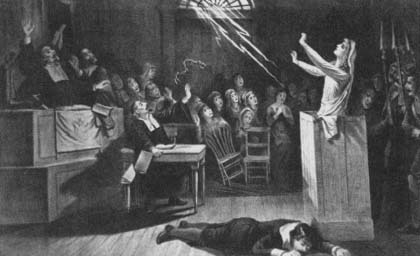Salem Witchcraft Trials: 1692
Jails Fill With Accused
By May, the jails of Salem Town and Boston were filled with people awaiting trial. More women than men, the accused ranged from Dorcas Good, 5-year-old daughter of Sarah, to the Reverend George Burroughs, formerly the pastor of Salem Village. Ann Putnam claimed Burroughs was responsible for the deaths of his first two wives and of soldiers fighting Indians along the border. Reverend Cotton Mather believed Burroughs was the witches' master conspirator.
Also by May, Massachusetts had a new charter and a new governor, Sir William Phips. Phips convened the General Court, which appointed a special court to try the witches. He then left to tackle more pressing matters of skirmishes along the borders.
The first tried was Sarah Bishop, a tavern keeper. According to Samuel Gray, Bishop's specter appeared over the cradle of his child, bringing about the child's illness and death. Bishop was convicted and, on June 10, hanged.
Next, the judges consulted several ministers for guidance on witchcraft evidence. The ministers warned against heavy reliance on spectral evidence, saying the "demon may assume the shape of the innocent."
The court reconvened June 28. Of the five tried, one was briefly acquitted. The jury was impressed by Rebecca Nurse's demeanor and by a petition testifying to her character. Her daughter, Sarah Nurse, submitted a deposition:
I saw Goody [term of address] Bibber pull pins out of her close [sic] and held them between her fingers and clasped her hands round her knees and then she cried out and said Goody Nurse Pinched her. This I can testify.
 Nineteenth-century depiction of a witch trial.
Nineteenth-century depiction of a witch trial.
After the verdict was read, the girls fell into howling fits, and Justice William Stoughton addressed the jury foreman:
I will not impose on the jury, but I must ask you if you considered one statement made by the prisoner. When Deliverance Hobbs was brought into court to testify, the prisoner, turning her head to her said, "What, do you bring her? She is one of us.' Has the jury weighed the implications of this statement?
Asked for an explanation, the half-deaf woman did not answer. After reconsideration, Rebecca Nurse was found guilty.
On July 19, the five women were hanged. Urged to confess by Reverend Nicholas Noyes, because "she knew she was a witch," Good retorted:
You're a liar. I am no more a witch than you are a wizard. If you take my life away, God will give you blood to drink.
Reports are that Noyes died bleeding from the mouth.
Six more were convicted in August. The execution of Elizabeth Proctor was delayed because she was pregnant. The delay saved her life. Her husband, John Proctor, an outspoken critic of the girls' visions, was hanged. His servant girl, Mary Warren, had tried to recant. Away from magistrates and the other girls, Warren would slowly return to a rational state of mind. Faced by them, she would dissolve into hysteria. Sarah Churchill, who also briefly recanted, said in private:
If I told Mr. Noyes but once I had set my hand to the Book [witches book] he would believe me, but if I told him one hundred times I had not he would not believe me.
In September, 15 were convicted. Eight were hanged. These would be the last hangings. Trials were suspended and further executions postponed by Phips. Phips soon released into the custody of their families those against whom there was only spectral evidence.
Additional topics
- Salem Witchcraft Trials: 1692 - Evidence Questioned
- Salem Witchcraft Trials: 1692 - Magistrates Hold A Hearing
- Other Free Encyclopedias
Law Library - American Law and Legal InformationNotable Trials and Court Cases - 1637 to 1832Salem Witchcraft Trials: 1692 - Magistrates Hold A Hearing, Jails Fill With Accused, Evidence Questioned